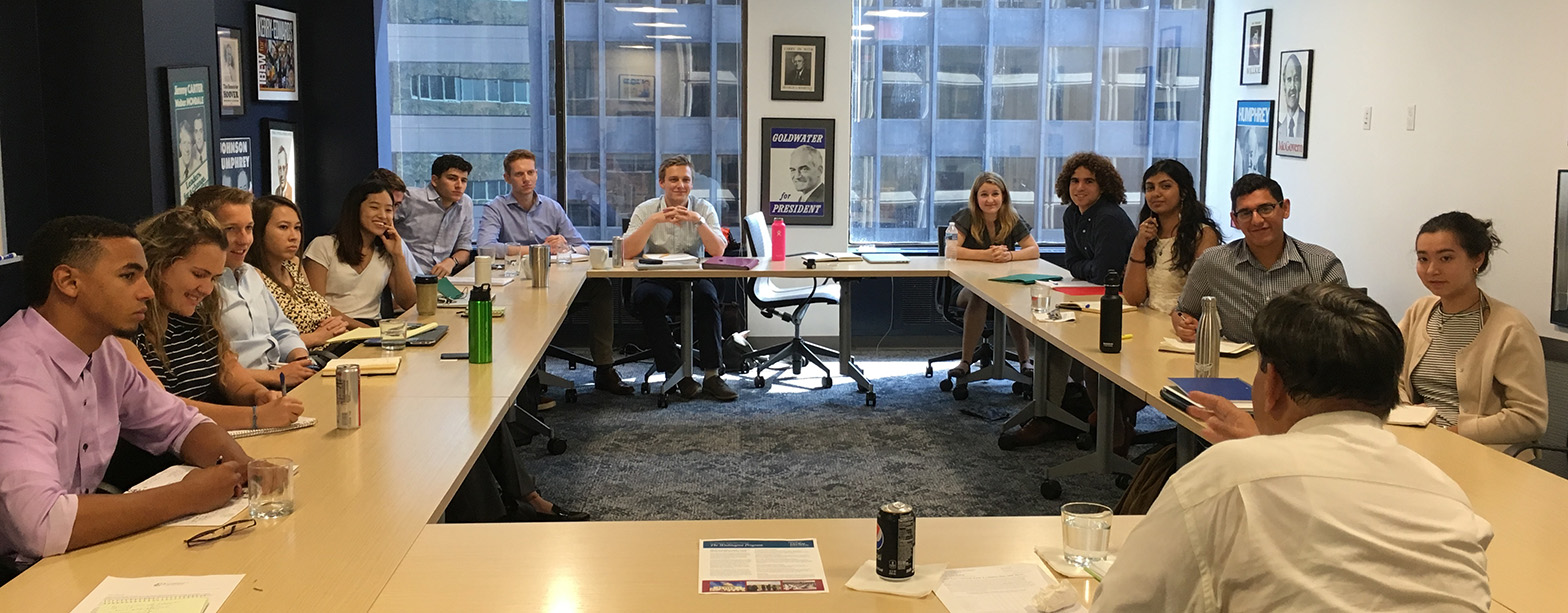The academic component of the program is designed to support the professional internship. A total of three academic courses are offered alongside the internship. Two of the courses are taught in the evenings at the CMC Washington Program facility. These courses are led by CMC Washington Program faculty members who have expertise in their subject-matter and years of professional experience working in D.C.
The third course is the Washington Research Project. This opportunity allows students to choose between a structured research project or a customized research experience on a topic of their choice. Both options allow students to hold interviews with Washington, D.C. professionals and conduct original research.
The coursework for the program is as follows:
- GOVT030: Washington Internship
- GOVT126B: Problems in Public Policy
- GOVT 128: Power, Politics, and Persuasion in Washington
- GOVT127: Washington Research Project
- Two options are offered:
- Individualized Independent Study
- Structured Independent Study
- Two options are offered:
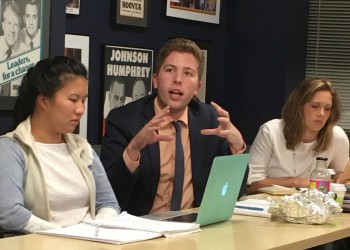
Curriculum
The Washington Program integrates practical work and academic study in a four-course credit program. All courses are completed for a letter grade. Each component of the program is designed to create an academically and professionally robust Washington, D.C. experience.
Government 030: Washington Internship
All participants in the Washington Program will be registered for this 1-unit course. The internship is expected to familiarize students with the Washington, D.C. political ecosystem populated by federal agencies, lobbying firms, think tanks, private companies, non-profit organizations, and other entities associated with policy making. Intern duties vary by organization and assignment. Interns may end up drafting legislation, working on foreign policy issues, planning activities of nonprofit organizations, interacting with visitors and advocacy groups, helping with administrative work, writing press releases, or doing research for companies, scholars and experts. All internships should provide students with experience of an early-career professional staff. Students must inform the program director if their internship does not meet these requirements.
Government 126B: Problems in Public Policy
This course will deal with the causes and consequences of public policies, with special attention given to analysis of the roles of national political institutions, of interest groups and of the political environment in shaping public policies. Primary focus will be placed on policies of social import. Taken as part of the Washington Program.GOVT128 CM - Power, Politics, and Persuasion in Washington
This course examines the mores, folkways, and working styles of the political communities of Washington, DC. Students will analyze the formal and informal “rules of the game” both through scholarly literature and their own experiences as interns, coming to an understanding of how policies are made in Washington. They will also study and practice various genres of political writing.
Government 128: Power, Politics, and Persuasion in DC
This course examines the mores, folkways, and working styles of the political communities of Washington, D.C. Students analyze the formal and informal “rules of the game” both through scholarly literature and their own experiences as interns. In addition, students’ study historical and current examples of competition of ideas inside the Beltway and the way by which think tanks and the bureaucracy influence policy making. Class discussions also address the role of money and back-room deals in politics and examine the extent to which mechanisms are in place to curb misconduct, waste, and fraud in government agencies. As persuasion and argumentation are essential skills for those working in political communities in Washington, the class also studies and practices various genres of political writing, including speeches, op-eds and policy memos.
Government 127: Washington Research Project
This course is designed to provide an introduction to research in Washington, D.C., and to give students an opportunity to choose the subjects of their research. The class will begin with an overview of a few of the research resources available in Washington, D.C., such as the Library of Congress, the National Archives, Washington-based online resources, and interviews with influential figures. Following this introduction, students will select one of the following independent study options:
- Individualized Independent Study
This option is available to anyone in the program, but is particularly suitable for students interested in using their Washington research project as a launching pad for their senior thesis. For this option, students will choose a research topic which is directly related to their internship. They will then work with the program staff to identify an appropriate research supervisor to oversee their independent study project. Students may choose to work with either a faculty member from one of the Claremont colleges or a CMC Washington Program faculty member.
The availability of faculty to serve as a research advisor varies from semester to semester.
- Structured Independent Study
For this option, students choose from a selection of structured independent study (SIS) courses developed and supervised by Claremont college professors. SIS courses are usually offered in Government and International Relations and, depending on the semester, they may also be offered in other fields. Recent examples include courses on midterm elections, the abdication of congressional power, the Trump phenomenon, policy dilemmas of World War II, and technology, security, and politics.
Academic Credit
The CMC Washington Program offers four course credits. CMC and Pomona government students may count two courses towards the major (not including Government 30, the internship course). Additionally, Government 30 meets the experiential requirement for the CMC Leadership Sequence.
Students are encouraged to work with their academic advisor(s) to determine which courses may be counted toward their major or sequence. CMC students seeking non-Government department major or sequence credit for any course on the Washington Program must have written approval from the appropriate department chair. This is most common for GOVT127 Washington Research Project, which has been previously been taken, with the approval of the department chair and the program director, for Economics, History, or International Relations major credit. Students with department chair approval seeking non-government credit will have a research advisor in the relevant department or program.
The following is a list of research advisors who worked with CMC Washington Program students over the last two years. Research advisors are not limited to the contacts provided here. Students are welcome to choose an advisor from any of the Claremont educational institutions, including the graduate school.
Recent Independent Study Research Advisors
- William Ascher, Government, CMC
- Roderic Camp, Government, CMC
- W. Bowman Cutter, Economics, Pomona
- Matt Glassman, Government, CMC,
- Maija Harkonen, Government, CMC,
- Eric Helland, Economics, CMC
- Charles Kesler, Government, CMC
- Lisa Koch, Government, CMC
- Wendy Lower, History, CMC
- Fred Lynch, Government, CMC
- Ken Miller, Government, CMC
- Christopher Nadon, Government, CMC
- Gilda Ochoa, Chicana/o-Latina/o Studies, Pomona
- Emily Pears, Government, CMC
- John J. Pitney Jr., Government, CMC
- Anne Quinley, Public Policy, Pomona
- Melissa Rogers, International Studies, CGU
- Shanna Rose, Professor of Government
- Andrew Sinclair, Government, CMC
- Aseema Sinha, Government, CMC
- Jennifer Taw, Government, CMC
- Thomas Willett, Economics, CMC
- Arely Zimmerman, Chicana/o-Latina/o Studies Program, Pomona
Faculty and Staff
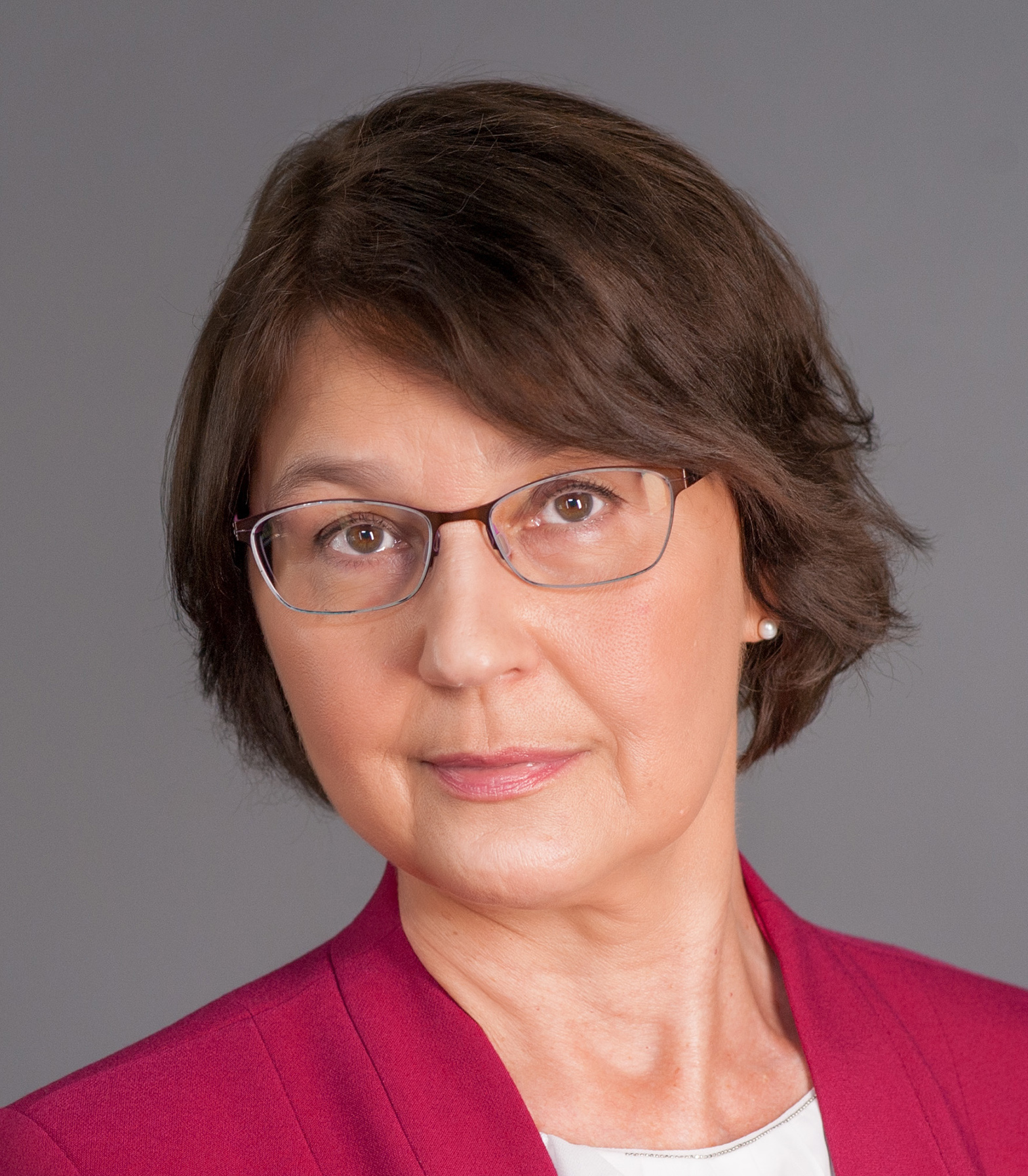
Maija Harkonen, Ph.D.
Washington Program Director and Professor of Government
Maija Harkonen has lectured at Georgetown University, John Hopkins University, CMC, St. Mary’s College of Maryland, Moscow State Institute for International Relations in Russia and Lahti University of Technology in Finland. Her courses have covered American government, comparative politics, and U.S. foreign policy. She has presented papers at national and international conferences and published articles. During her employment in the private sector, Dr. Harkonen led multinational projects, including one in Estonia for which she secured funding from the U.S. Trade and Development Agency. In Finland, she managed a European Union funded project, helping Nordic companies establish their operations in China. While working as Director of Strategic Partnerships for FCG International, she focused on mobile healthcare technology and participated in numerous international trade delegations led by the Ministry of Economic Affairs and Employment. Prior to accepting her current position, she served as Executive Director of the Center for the Study of Democracy at St. Mary’s College of Maryland. There she organized numerous forums and public lectures and hosted members of Congress, scholars, policy experts, and international civil servants. Maija received her B.A. from the University of Texas at Austin and her doctoral and master’s degrees in Government from Georgetown University.
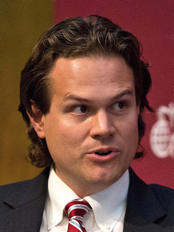
Zachary Courser, Ph.D.
Director of CMC's Policy Lab and Professor of Government
Zachary Courser is Director of CMC's Policy Lab and a visiting Assistant Professor of Government at Claremont McKenna College. His research agenda focuses on public policy, political parties, democracy and populism. He recently co-authored a report for the American Enterprise Institute on the need for reinstating congressional earmarking, entitled "Restoring the power of the purse: Earmarks and re-empowering legislators to deliver local benefits" (AEI, 2021). He is a contributor and editor of the volume Parchment Barriers: Political Polarization and the Limits of Constitutional Order (University Press of Kansas, 2018), the result of a year-long, multi-disciplinary research project examining the dynamics of polarization through an examination of conflicts over the American constitutional order. Prof. Courser has led several research partnerships for CMC’s Policy Lab with a variety of think tanks, including Bipartisan Policy Center, RAND Corporation, American Enterprise Institute, and the Brookings Institution. He’s a regular commentator on California and national politics on Southern California Public Radio, and has worked on Capitol Hill and for a London-based think tank. He holds a master’s and doctoral degree in government from the University of Virginia, and a bachelor’s in government from Claremont McKenna College.
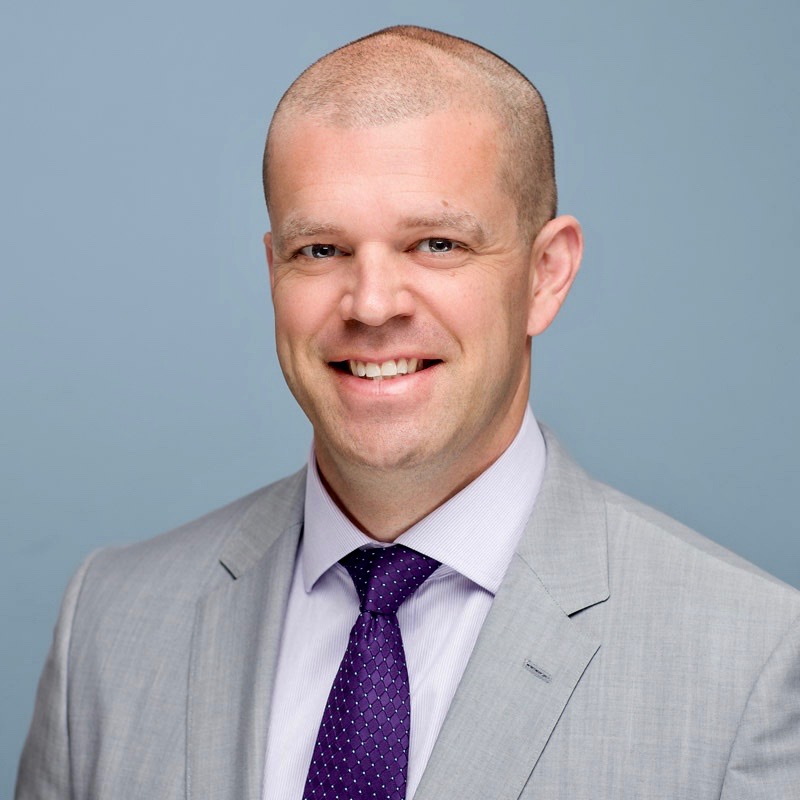
Matt Glassman, Ph.D.
Professor of Government
Matt Glassman is a Senior Fellow at the Government Affairs Institute at Georgetown University. He has taught courses on and off the Hill on American government, congressional process, congressional- presidential relations, and congressional leadership. He has worked in legislative politics in both Washington and New York State, and on local, state, and federal campaigns. Prior to joining GAI, Matt worked on the Hill at the Congressional Research Service for ten years. His portfolio included congressional operations, separation of powers, appropriations, judicial administration, agency design, and congressional history. He was detailed to the House Committee on Appropriations as professional staff for the Legislative Branch Subcommittee in FY2010 and FY2011. Prior to coming to Washington, Matt worked in the New York State Senate. Matt received both his doctoral and master's degrees in political science for Yale University. He also holds a bachelor's from Hamilton College.
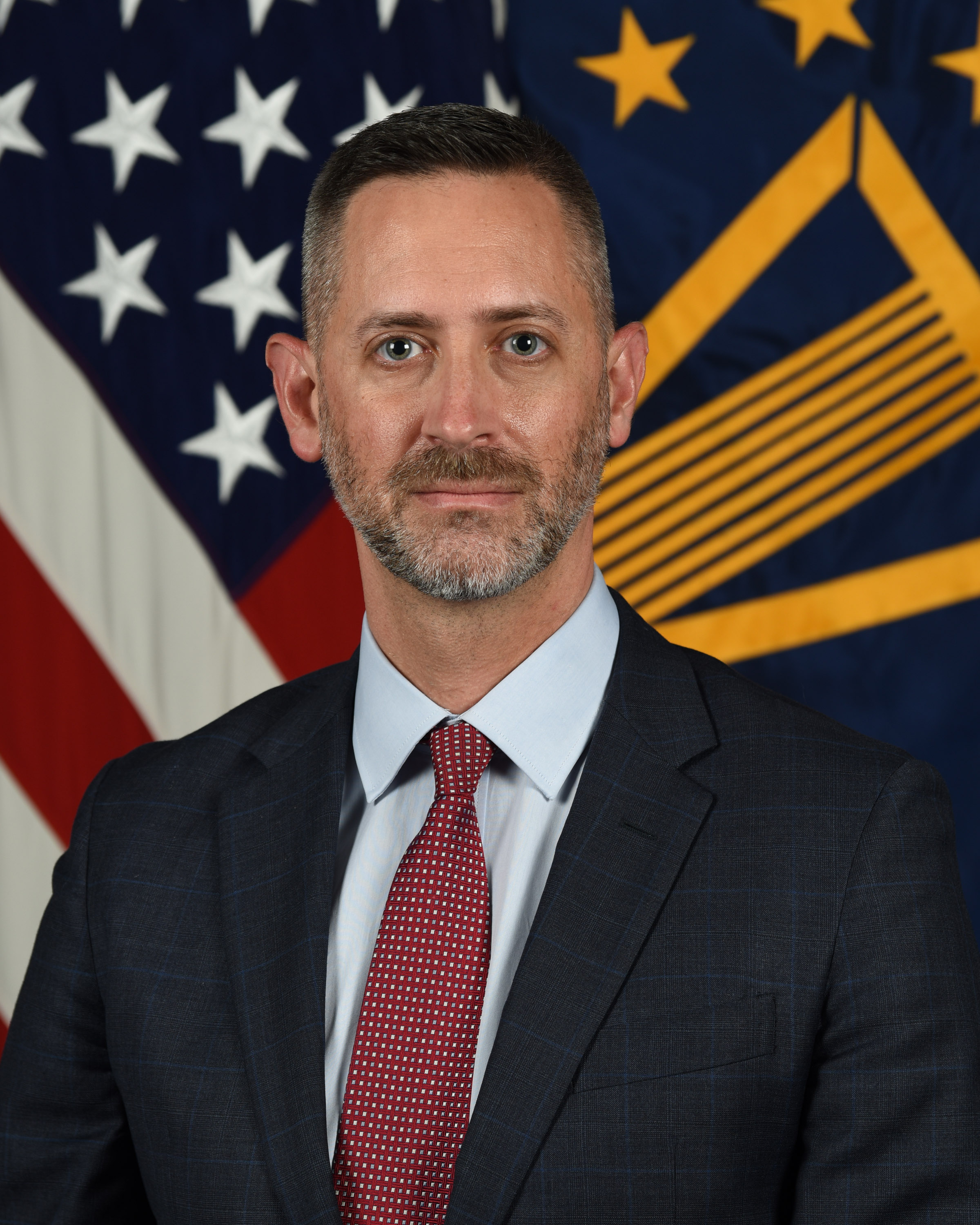
Richard C. Johnson CMC ’01
Visiting Lecturer of Government
Richard C. Johnson joins the Government Department as a Visiting Lecturer on the Washington Program. Johnson previously served as Deputy Assistant Secretary of Defense for Nuclear and Countering Weapons of Mass Destruction (CWMD) Policy, where he led U.S. efforts on nuclear deterrence and WMD threat reduction. Before his appointment at the DOD, Richard served as the senior director for fuel cycle and verification at the Nuclear Threat Initiative. He has held key roles at the National Security Council, as Director for Nonproliferation, and at the U.S. Department of State, including as Acting Deputy Lead Coordinator for Iran Nuclear Implementation. Johnson has also worked extensively on North Korean nuclear issues throughout his career, and he served as a disablement monitor at North Korea’s Yongbyon nuclear facility. His academic and policy interests include arms control and disarmament, nuclear strategy and deterrence, nonproliferation, chemical and biological defense, and the implications of emerging technologies for international security. Johnson earned his Bachelor of Arts from Claremont McKenna College, where he graduated as valedictorian, and participated in the Washington Program, interning at the Senate Foreign Relations Committee. He holds a Master’s in Public Affairs from the School of Public and International Affairs at Princeton University.

John J. Pitney Jr., Ph.D.
Roy P. Crocker Professor of American Politics
John J. Pitney Jr. is the Roy P. Crocker Professor of American Politics at Claremont McKenna College in Claremont, California. He received his B.A. in political science from Union College, where he was co-valedictorian. He earned his Ph.D. in political science at Yale, where he was a National Science Foundation Fellow. From 1978 to 1980, he worked in the New York State Senate. From 1983 to 1984, as a Congressional Fellow of the American Political Science Association, he worked for Senator Alfonse D'Amato of New York and the House Republican Policy Committee, chaired by Representative Dick Cheney of Wyoming. From 1984 to 1986, he was senior domestic policy analyst for the House Republican Research Committee. He joined the Claremont McKenna College faculty in 1986. From 1989 to 1991, during a leave of absence, he worked at the Research Department of the Republican National Committee, first as deputy director, then as acting director. He has written articles for The New Republic, The Weekly Standard, The Wall Street Journal, The Los Angeles Times, and Roll Call, among others. His scholarly works include The Art of Political Warfare, published in 2000 by the University of Oklahoma Press (with Joseph M. Bessette), American Government and Politics: Deliberation, Democracy, and Citizenship (Cengage), and After Reagan: Bush, Dukakis, and the 1988 Election, published in 2019 (the University Press of Kansas).
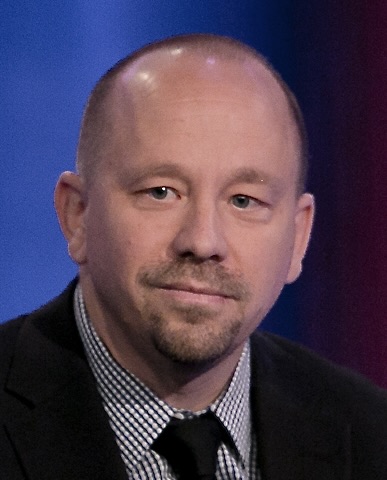
Jon A. Shields, Ph.D.
Professor of American Politics and Chair of the Government Department
Jon A. Shields is a professor of American politics in the government department at Claremont McKenna College. He is the author or co-author of four books on the American right: The Republican Civil War: What Liz Cheney's Wyoming Tells Us About a Divided American Right (Forthcoming, Oxford University Press), Trump’s Democrats (Brookings, 2020), Passing on the Right: Conservative Professors in the Progressive University (Oxford University Press, 2016), and The Democratic Virtues of the Christian Right (Princeton University Press, 2009). His writings have also appeared in various popular outlets, including the Atlantic, Bulwark, Los Angeles Times, New Republic, Wall Street Journal, Washington Post, and New York Times. He received a B.A. from the University of California, Santa Barbara, and a Ph.D. from the University of Virginia.

